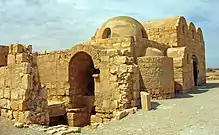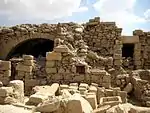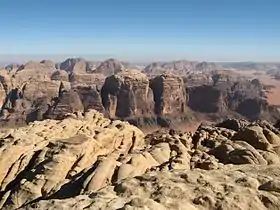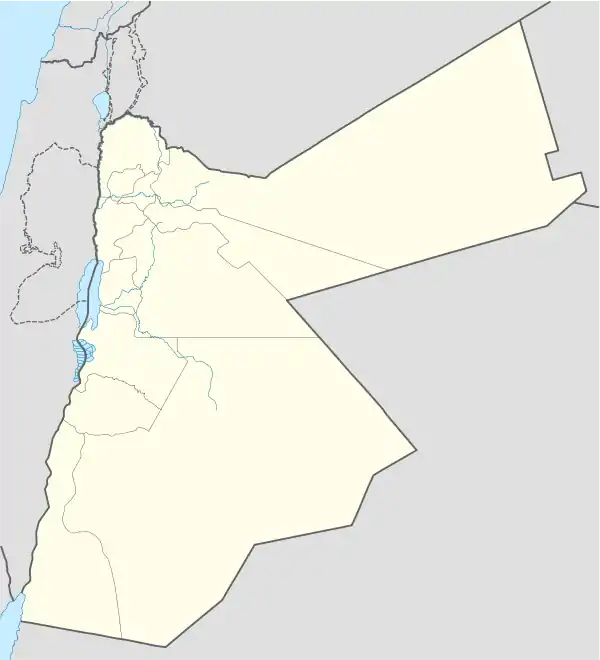List of World Heritage Sites in Jordan
The United Nations Educational, Scientific and Cultural Organization (UNESCO) World Heritage Sites are places of importance to cultural or natural heritage as described in the UNESCO World Heritage Convention, established in 1972.[1] Jordan accepted the convention on 5 May 1975, making its historical sites eligible for inclusion on the list. As of 2016, five sites in Jordan are included.[2]
Location of World Heritage Sites in Jordan.
World Heritage Sites
- Site; named after the World Heritage Committee's official designation[3]
- Location; at city, regional, or provincial level and geocoordinates
- Criteria; as defined by the World Heritage Committee[4]
- Area; in hectares and acres. If available, the size of the buffer zone has been noted as well. The lack of value implies that no data has been published by UNESCO
- Year; during which the site was inscribed to the World Heritage List
- Description; brief information about the site, including reasons for qualifying as an endangered site, if applicable
| Site | Image | Location | Criteria | Area ha (acre) |
Year | Description |
|---|---|---|---|---|---|---|
| Baptism Site "Bethany Beyond the Jordan" (Al-Maghtas) | .JPG.webp) |
Balqa Governorate 31°50′14″N 35°33′10″E |
Cultural: (iii)(vi) |
294 (730) | 2015 | Situated on the Jordan River, Al-Maghtas is considered the location of the Baptism of Jesus by John the Baptist. A Christian pilgrimage site, it contains remains of Roman and Byzantine churches, chapels, a monastery, caves and pools.[5] |
| Petra | _-_Petra%252C_Jordan_-_14_Oct._2009.jpg.webp) |
Ma'an Governorate 30°19′50″N 35°26′36″E |
Cultural: (i)(iii)(iv) |
— | 1985 | The Nabataean city of Petra was a major trading hub between Arabia, Egypt and Syria-Phoenicia, famed for its rock-cut architecture it is entirely made out of sandstone with more than 40 tombs as well as its mining and water engineering systems.[6] |
| Quseir Amra |  |
Zarqa Governorate 31°48′7″N 36°35′9″E |
Cultural: (i)(iii)(iv) |
— | 1985 | The desert castle of Quseir Amra was built in the early 8th century, and had served both as a fortress and an Umayyad royal palace. The site also noted for its extensive frescoes, constituting an important and unique example of early Islamic art.[7] |
| Um er-Rasas (Kastrom Mefa'a) |  |
Madaba Governorate 31°30′6″N 35°55′14″E |
Cultural: (i)(iv)(vi) |
24 (59) | 2005 | Established as a Roman military camp, Um er-Rasas grew into a settlement by the 5th century, inhabited successively by Christian and Islamic communities. The largely unexcavated site contains ruins of Roman fortifications, churches with well-preserved mosaic floors and two stylite towers.[8] |
| Wadi Rum Protected Area |  |
Aqaba Governorate 29°38′23″N 35°26′02″E |
Mixed: (iii)(v)(vii) |
74,180 (183,300) | 2005 | Situated in southern Jordan, Wadi Rum features a great variety of desert landforms including sandstone valleys, natural arches, gorges, cliffs, landslides and caverns. The site also contains extensive rock art, inscriptions and archaeological remains, bearing witness to more than 12,000 years of continuous human habitation.[9] |
Tentative list
In addition to sites inscribed on the World Heritage List, member states can maintain a list of tentative sites that they may consider for nomination. Nominations for the World Heritage List are only accepted if the site was previously listed on the tentative list.[10] As of 2016, Jordan lists fourteen properties on its tentative list:[11]
| Name | Date |
|---|---|
| Abila City (Modern Qweilbeh) | 2001 |
| Al Qastal (Settlement) | 2001 |
| Arab Eclecticism - Foundation and evolution of an Architectural School in the city of As-Salt | 2015 |
| Azraq | 2007 |
| Dana Biosphere Reserve | 2007 |
| Gadara (Modern Um Qeis or Qays) | 2001 |
| Jerash Archaeological City (Ancient Meeting Place of East and West) | 2004 |
| Mujib Nature Reserve | 2007 |
| Pella (Modern Tabaqat Fahil) | 2001 |
| Qasr Al-Mushatta | 2001 |
| Qasr Bshir (a Roman Castellum) | 2001 |
| Shaubak Castle (Montreal) | 2001 |
| The Sanctuary of Agios Lot, At Deir 'Ain 'Abata | 2001 |
| Um el-Jimal (City) | 2001 |
See also
References
- "The World Heritage Convention". UNESCO. Retrieved 8 August 2016.
- "Jordan". UNESCO. Retrieved 8 August 2016.
- "World Heritage List". UNESCO. Retrieved 28 May 2010.
- "The Criteria for Selection". UNESCO. Retrieved 10 September 2011.
- "Baptism Site "Bethany Beyond the Jordan" (Al-Maghtas)". UNESCO. Retrieved 6 Oct 2015.
- "Petra". UNESCO. Retrieved 17 August 2011.
- "Qasr Amra". UNESCO. Retrieved 17 August 2011.
- "Um er-Rasas (Kastrom Mefa'a)". UNESCO. Retrieved 17 August 2011.
- "Wadi Rum Protected Area". UNESCO. Retrieved 17 August 2011.
- "Tentative Lists". UNESCO. Retrieved 7 October 2010.
- "Tentative List – Jordan". UNESCO. Retrieved 7 August 2016.
This article is issued from Wikipedia. The text is licensed under Creative Commons - Attribution - Sharealike. Additional terms may apply for the media files.

